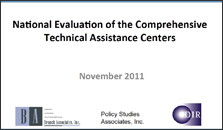Centers of Support: Assessing the U.S. Department of Education's Technical Assistance Program for ESEA Implementation

Authors: Brenda J. Turnbull, Judy Wurtzel (moderator), Sherrill Parris, Dr. Sally Wherry, Nancy Coopersmith, Robin Jarvis
| Price: Available free online |
Available online: multimedia
![]()
This webinar was held November 7, 2011, and discusses the U.S. Department of Education's technical assistance program for implementing provisions of the Elementary and Secondary Education Act. The author of an independent national evaluation of the program presented the study's major findings, and participants in the webinar had the chance to ask questions and discuss key elements with state officials.
Moderator: Judy Wurtzel, Former Deputy Assistant Secretary for Policy, U.S. Department of Education
Presenter: Brenda J. Turnbull, Principal, Policy Study Associates and author of the "National Evaluation of the Comprehensive Technical Assistance Centers"
Discussants:
- Sherrill Parris (sparris@alsde.edu): Assistant State Superintendent of Education, Alabama Department of Education
- Dr. Sally Wherry (sally.wherry@state.mn.us): Supervisor, Student Support Services Division, Minnesota Department of Education
- Nancy Coopersmith (ncoopersmith@mt.gov): Assistant Superintendent, Education Services Department, Montana Office of Public Instruction
- Robin Jarvis (robin.jarvis@sedl.org): Program Manager, SEDL's Southeast Comprehensive Center
Background:
The Comprehensive Technical Assistance Centers is a federally funded program that provides technical assistance to states in connection with the Elementary and Secondary Education Act. The law authorizing the Centers, the Educational Technical Assistance Act of 2002, mandated that a national evaluation of the program be conducted by the Institute of Education Sciences (IES). The legislation indicated that the evaluation should "include an analysis of the services provided ... and whether such services meet the educational needs of State educational agencies, local educational agencies, and schools in the region." With the redesign of the Center program, the primary focus of technical assistance was directed to states. In order to build states' capacity for carrying out No Child Left Behind (NCLB) responsibilities, which include assistance to struggling school districts and schools as well as other areas of NCLB program administration, the Center program was designed to provide ongoing technical assistance in using research knowledge and promising practices.
